Shtefan, a Ukrainian national team player, has joined the armed forces to defend his country. Here's his journey.
August 9, 2023 by Ned Garvey in Interview with 0 comments
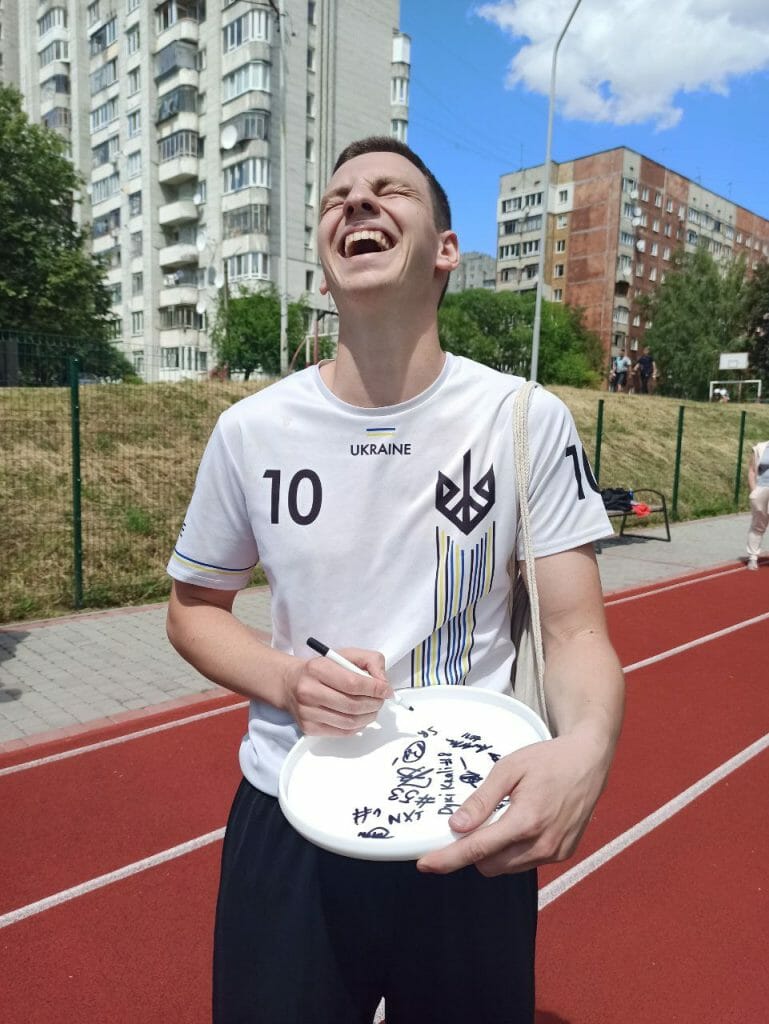
Vlad Shtefan is a Ukrainian ultimate player from the western Ukrainian city of Lviv, an integral part of the Ukrainian ultimate community, and a member of the country’s national team. As his teammates told me in December, he’s an emotional force, a leader on the team. However, you won’t find his name on the rosters that took fourth at the European Indoor Ultimate Championships in Lithuania, or the Ukrainian mixed team that won bronze at the European Beach Ultimate Club Championships. Instead, Vlad volunteered to join the Armed Forces of Ukraine (AFU) in the fall of 2022. This is his story, in his own words, from February 24, 2022, up to now.
This interview was conducted in April 2023. It has been edited for length and clarity.
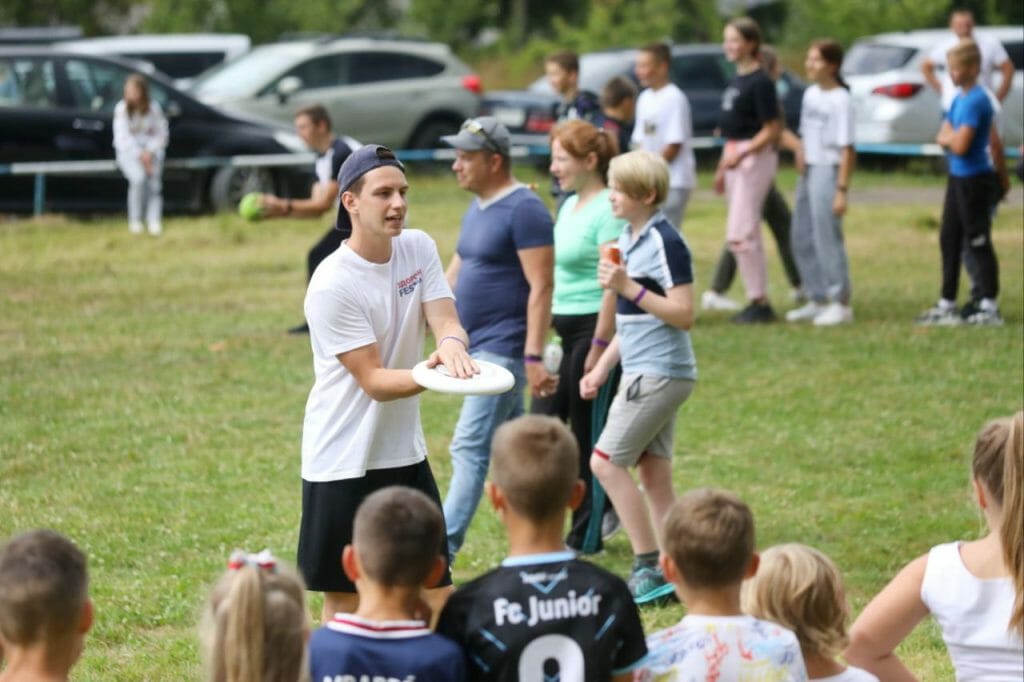
The beginning of the full-scale invasion1
On February 24, I woke up in Kyiv with COVID. I was returning from an ultimate tournament in Zaporizhzhia, and Kyiv was on my way to Lviv, where I live.
I woke up around 10:00 because I had a fever, I didn’t feel well. I had about 30 missed calls from my relatives.
It’s hard to describe my emotions, because my condition was VERY bad. But the first thing I did was write a 10-point checklist to my mother, including: fill the bath with water, pack a backpack that you can leave the house for a certain period of time with. After that, a kind of mental paralysis began and a complete incomprehension of what was happening. At first, I thought of joining the Territorial Defense Forces2. Then I realized that I had a fever, I was sick, I wouldn’t be of any use there. There was complete panic, chaos in my head.
For the first week or two, I practically did not leave the building. I had some products in the apartment. I asked a colleague to go to the store and buy me some groceries for a week, because I knew I shouldn’t leave due to COVID. So for the first few days I had groceries. Then I started really going out to the store and looking at the empty shelves. I didn’t need anything special, but, for example, there were no vegetables, no fruits, stuff like that, but there was something, so I didn’t starvе.
One night I was standing at 22:00 or 22:30, I looked up… At first, for a couple of seconds, it seemed like a star was falling, and then I realized it wasn’t a star, but a missile. I lived near Beresteyska, in western Kyiv. From there it’s 20km to Irpin, to Bucha, where there was constant shelling. We heard it all day, but by the third day you just got used to it, and it banged and banged. And then — this rocket was flying, and I understood that I needed to run 50 meters to the shelter, but there was no point. I mean, if it flies near you — that’s it. And you just stand, watching, unable to do anything. That’s the first thing I remember clearly.
And the second was on the 12th of March, the last evacuations from Bucha and Irpin had started. A good friend of mine lived in Bucha at the time, he would contact me once a week, saying, “I’m alive, everything is OK, speak soon” — to save the battery on his phone. There was no electricity, it was hard to charge your phone. And, I don’t remember exactly, on that day he wrote me: “Vlad, I’ll most likely be evacuated. There’s a possibility. The last buses are coming. The women and children have already been evacuated, now they can get the men out of here.”
He managed to get out. I met him in Kyiv… just… well… the person had changed completely. I tried to help him, I fed him. He took a shower, and I recognized my friend a little. And I was relieved — because we’ve known each other since childhood, he’s a good friend. He also joined the AFU, by the way. The fact that he managed to get out of there was the first positive news. He told me scary things. That he would look out the window, and there would be a tank with the letter V passing by. A rocket flew into his neighbor’s house, and the whole thing was ruined. He never found out what happened to his neighbor.
After one and a half, two months, I returned to Lviv to work in a humanitarian aid center. We packed things and sent them to wherever they were needed. People come in the morning and have a clear task for eight hours, packing those boxes. We almost didn’t take any breaks: we would eat some energy bars at lunch and continue working. And then the person in charge would tell us at 18:00 or 20:00: “That’s it, that’s enough for today.” We’d pack up and leave. People acted in a coordinated manner, with a clear task.
At that moment, I no longer saw any confusion or fear in the eyes [of the other volunteers]. People simply knew that they had free time for it, because there were many internally displaced persons (IDPs) from other regions. They helped, slept, woke up — and [started] again.
As a person who could teach ultimate, I was asked to organize lessons for IDPs, especially children. We would go to a school in Lviv where internally displaced children lived with their parents and offer the parents classes for their children. Mostly, everyone agreed, because they just sat in schools or shelters and had nothing to do.
It was difficult in the beginning. I didn’t know how to establish a relationship with them, because I was used to working with children in Lviv who were proactive and cheerful. And of course, it was necessary to approach these children individually, because they were so, I don’t know how to put it correctly… lost, with their heads down. They needed guidance, help. But after 20 or 30 minutes of drills, their eyes would light up. It was obvious they liked it, that they needed it. Because children need sports, they need some kind of development. And then, when I visited those children again, everything was completely different. They would say, “of course, come again! When will you come?” We gave discs away. And then, as with all children, it was much easier to communicate.
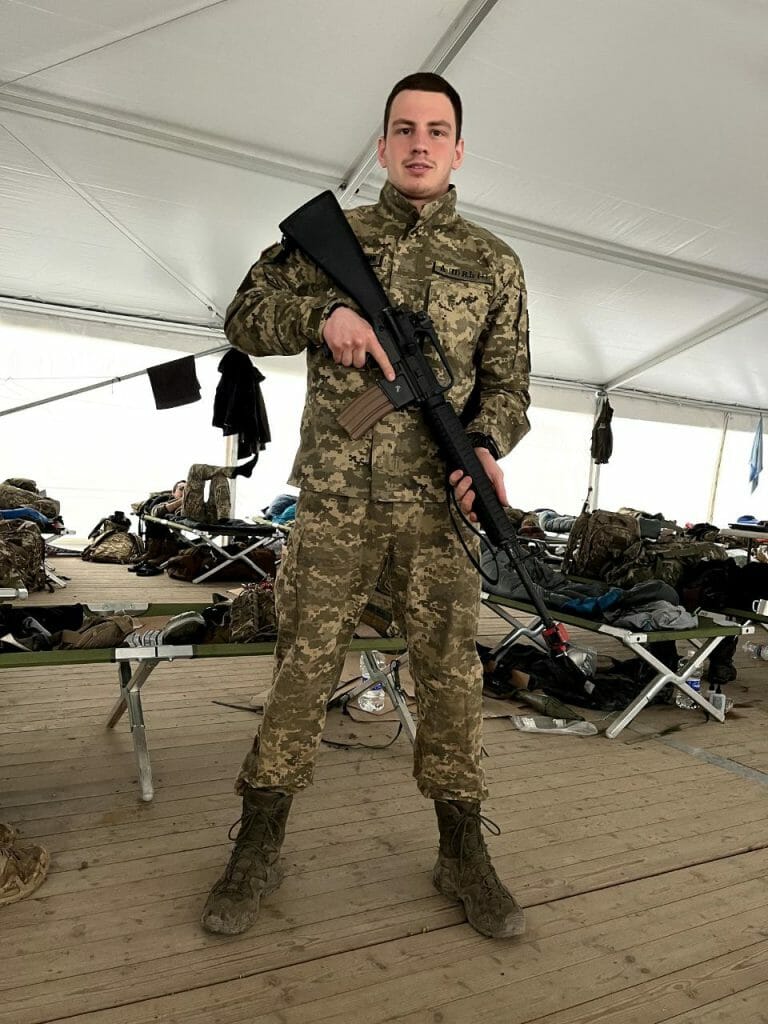
Joining the AFU
I joined the Armed Forces of Ukraine at the beginning of September 2022. At the end of August, I had an interview for the 47th Separate Mechanized Brigade, and by September I joined up with the unit.
Why did I make the decision? Because I understood that – yes, I helped as a volunteer, worked with children, IDPs, and when I was doing it at that time, I felt that I was useful, that I was helping my country, my people. However, then I would go home, and the next day I would wake up and not have to go to the humanitarian aid center, or teach the kids, and I would think, “Well, what’s next?” I helped, but it wasn’t enough for me. I’m a young, healthy, athletic guy. And recruitment is happening all the time. That means there’s a need. And I realized that the sooner I get there, the sooner I make the decision, the better it will be for me and, in the long run, for my country.
And how do I relate to the news, to what’s happening now? It hurts, it’s scary. That’s if we talk about my emotions.
Many people in our unit, eight out of 10, are civilians. And we sometimes call ourselves “civilians” because we still feel that way. We come from civilian life, but we know exactly why we’re here, that we want to learn to help our country drive out the enemy.
My unit commander is a musician, he writes songs, he had his own small rock band, and at the same time he worked in business, he has five years of experience at a consulting firm. He also decided he had to join. Another comrade is a developer, an ordinary programmer. Not a novice programmer, but one with a high salary. He also made the decision. He’s an expert in FPV drones, kamikaze drones3.
So they are ordinary people: programmers, people from the business world, from consulting. I used to work as a sales manager. We also have people who started fighting in 2014, and who were demobilized in 2016-2017. They just lived their civilian lives. And again, with the start of the full-scale invasion, they joined the army on the first, second, third day.
But when I collect myself, I try to realize that I am a soldier. That our losses have been huge, both in terms of territory, and in terms of our Ukrainians. But we have no choice: we just have to keep going, to liberate our territory. All I can do now is learn while I have the opportunity: we were sent abroad for basic training, and to coordinate the battalion. And now this is the culmination, before we go to the frontlines to show what we’ve learned.
So yes, all of this is difficult to process. But when I put everything together, my comrades help me, and I understand that we have no choice. We have to be strong and defend the freedom of our country, there is no other way.
Fundraising
At the beginning of the summer, before I joined the AFU, a friend of my best friend, who has been fighting for eight years, since the beginning of the anti-terrorist operation4, needed drones. We raised money for him twice and helped him buy various things. They were not very well supplied with ammunition, or even clothes. We would buy everything: uniforms, tactical backpacks, drones. He simply called when he had the chance, said what he needed, what his comrades needed, and we would find it for him.
Then, when I joined the army, I started collecting funds for my units. We have a fairly well-equipped division, compared to others, but there’s a need for various things. If we talk about our internal needs — for example, fuel for cars, camouflage nets, thermal imagers, drones — we raise and pool the funds, we purchase everything ourselves, so that when we go to the frontline, we’re fully equipped, because there may not be time [to fundraise] there.
I come across information on social networks [the nation is tired and that donations don’t come as quickly anymore], and probably, yes: through acquaintances, I can understand that people are gradually getting tired. After a year of the full-scale invasion, it’s obvious that donations will decrease. But again, let’s take the ultimate community in Ukraine, for example: the funds to buy a thermal imager for one guy were raised in two days. If the information is presented correctly, if someone realizes that without this thermal imager, or without this drone, they won’t be able to fight effectively, then, in my opinion, people still donate quickly — well, at least Ukrainians. I just haven’t worked that much with people from abroad, I don’t have experience.
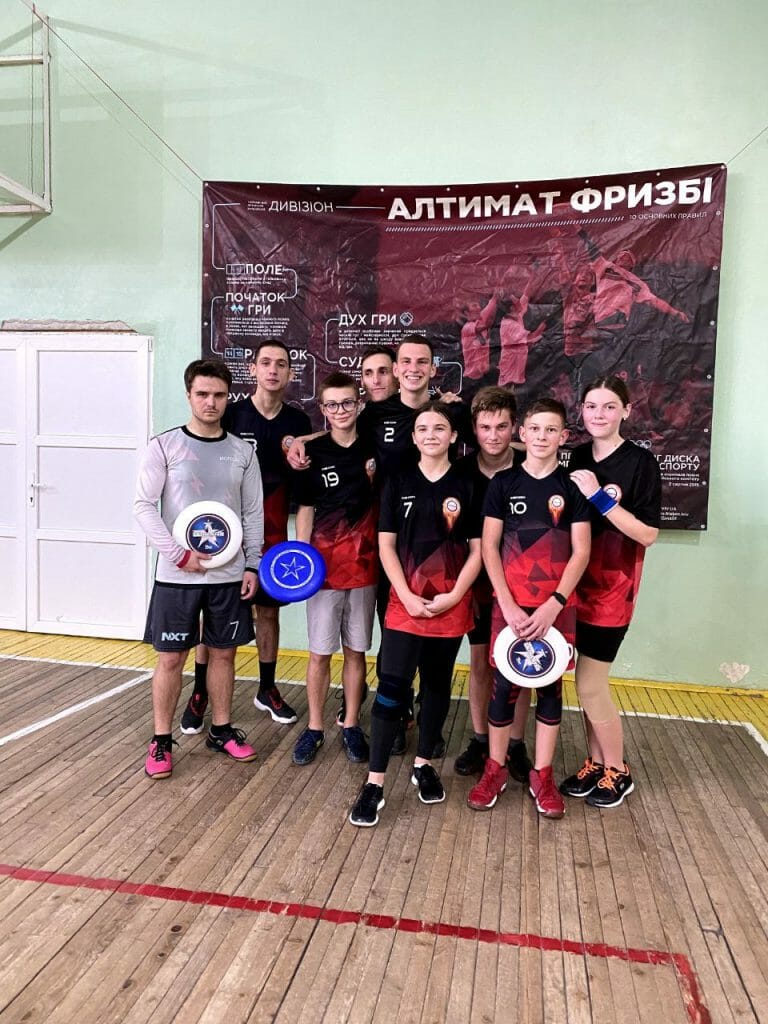
Ultimate, training kids, and developing the sport
We need to continue what we were doing before the full-scale invasion. Yes, it is clear that it’s difficult to go to international tournaments now. But even during the war we managed to organize a school league for children. Yes, maybe not as big as we did before the full-scale invasion, but we did it. All thanks to enthusiastic people who don’t give up, who train.
Recently, the kids sent me a video of how they were training inside: the air raid alarm went off, they went down to the shelter at the school, and they kept throwing the discs and doing drills in the shelter. And at such moments, I understand that I am in the right place, they are in the right place, the coaches who stayed there are in the right place. We have a teacher, Orysya, she has so much initiative, she has gathered an ultimate community around her and formed kids teams at a school. I’m thankful for such people, such unbreakable people, who continue working, continue training, and continue developing the sport. When there is an air raid alarm, they go down to the shelter, wait, and come back again. After training, Orysya goes to the humanitarian aid center and helps the military, packing and sending things. And that’s how life goes on.
Of course, children want activities under any circumstances, it’s their childhood, and no Russians will prevent us from raising a great young generation. It’s just that it’s much more difficult now, but at the same time, it instills in the children a certain will to win, a love for their country, because they understand everything perfectly well. I am sure that with such enterprising people, everything will work out.
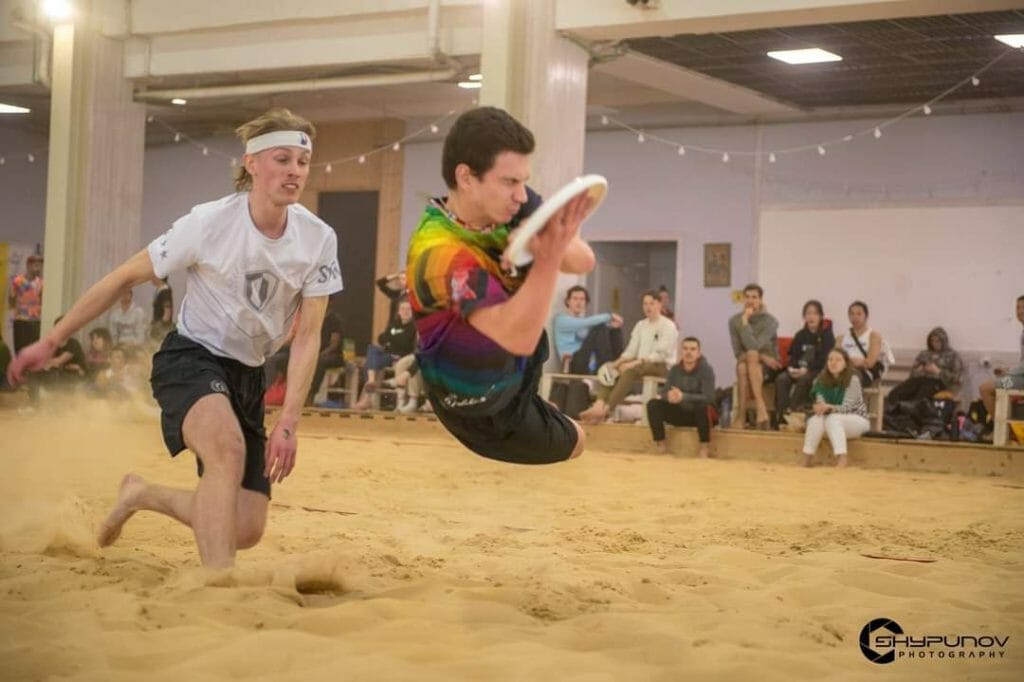
Missing out on ultimate
I managed to make one national team training while they were preparing for the European Championship in Lithuania. I was there, I played with them, I realized that we’re at the same level, one might say. I’ll put it like this: I was at basic training abroad at that moment, and I realized that this way, I can help my guys even more. Because I’m preparing to defend our country, and they represent the honor of our country. We have such a symbiosis. That is, I’m doing a very important thing for our country, perhaps a little for the future: I am learning to be a worthy soldier of the AFU. And they, at that moment, represent our country. It’s incredible… That’s why we will win. There will be many more European championships, I will work and play with them again. So everything is okay.
I watched the games [in Kaunas] partially, holding my phone with trembling hands, worried about them. I wrote some comments, supported [them]. They also mentioned me when interviewed. And that was an incredible, incredible feeling! I was very, very happy for them that they took fourth place at the European Championship. And I did my job and continue to do it. They do their job. There are no hard feelings.
We work for the sake of victory: they — on the sports field, me — on the battlefield.
Editor’s note
Since the time of the interview, Vlad finished his training abroad, returned to Ukraine, and was deployed to the front line to participate in the counter-offensive.
He has not stopped volunteering, he regularly raises money to provide his unit with necessary kit, and he finds the time to share and support the fundraisers of his comrades and other volunteers. In May 2023, his commander Andrii was terribly wounded – he lost both hands, his vision, and some of his hearing. Vlad helped raise money for Andrii’s initial rehabilitation and support.
He continues to be involved in the life of the Ukrainian ultimate community: he stays in contact with the Lynx school team and, together with the rest of the community, he supported the UkrMix team and celebrated their bronze medal from EBUCC 2023 in Royan, France.
If you would like to help, you can donate to the Play for Ukraine fundraiser for medical aid. To find out more about Play for Ukraine, click here.
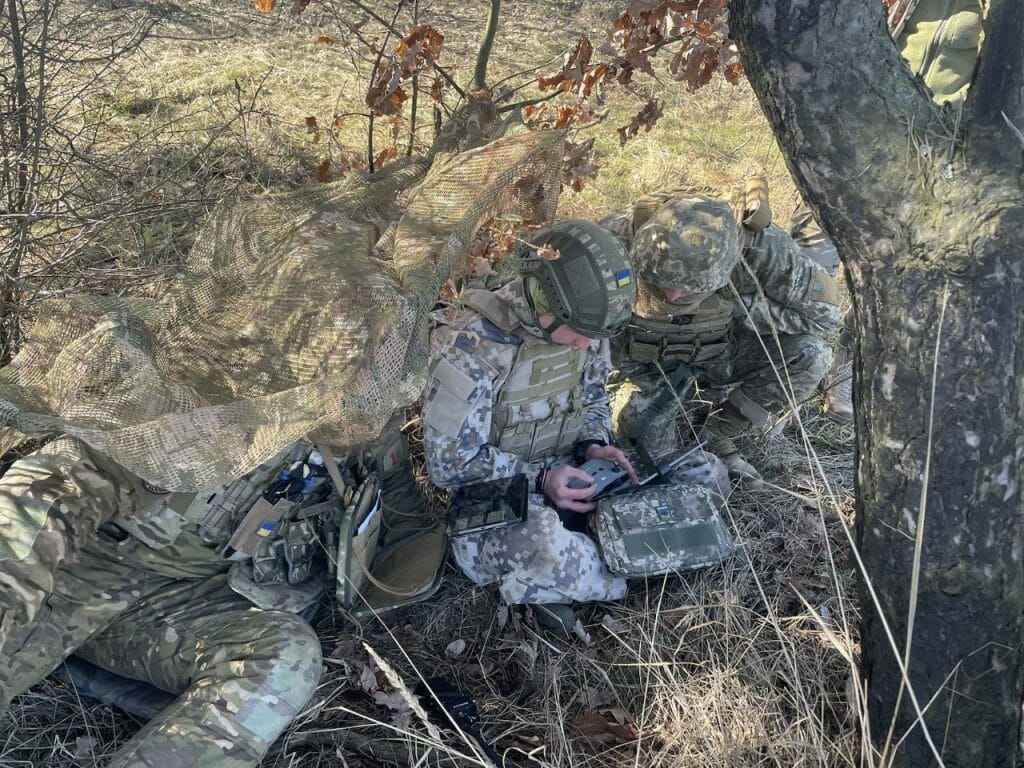
The war began in March 2014, when Russia annexed Crimea and backed so-called separatist forces in the Donbas. ↩
The Territorial Defense Forces of Ukraine is the volunteer and reservist portion of the AFU. Their role has shifted over the course of the full-scale invasion, and they have been involved in combat, law-and-order operations, emergency services, etc… By May 2022, some 110,000 people had joined the TDF. ↩
FPV, or First Person View drones, are a class of drones that require the operator to wear a headset to control a kamikaze drone. FPV drones are widely-used in Ukraine, and operators are sought after. ↩
This is the term that Ukraine, as well as organizations like the OSCE used to describe the combat operations in the Donbas which began in 2014. ↩